Jump to:
Do you have short hair, and it seems to be taking forever to grow? Did you once have long hair and miss those eternal beautiful locks?
A quick fix to getting the desired look you want is to invest in some hair extensions. If you’ve been asking yourself, “should I get hair extensions?” then this article is for you.
The 4 Types of Hair Extensions
There are four types of hair extensions available to you; Clip-in, tape-in, weaves, and microbeads. Each has its own advantages and disadvantages.
Regardless of which type you’re aiming to wear, each comes in synthetic or human hair. For long-lasting hair extensions, you’ll want human hair as these last longer, can be dyed, shaped, cut, and formed to your liking.
Synthetic hair extensions are man-made hair designed to mimic the look of human hair. The advantage of synthetic hair is that it’ll never lose its shape – what you buy is what you get. However, you cannot dye them, heat style them, or be completely free with them.
So, which hair extension is best for you?
Clip-in
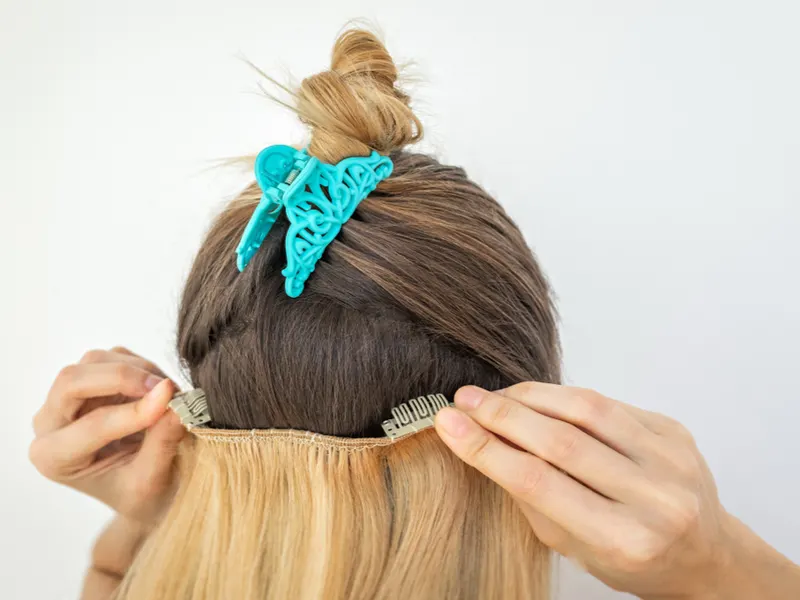
Shevdinov1/Shutterstock
Pros
- Easy to apply and recommended for beginners
- No pain or damage is caused to the natural hair
- Easily removed
- Fast process
- Affordable
- Perfect for night outs and holidays
Cons
- Must be removed every night
- Easily visible if you don’t wear them properly
- It may cause stress and tension on the scalp, which can be very uncomfortable
- Clip-ins are not for styling or for a customizable experience
- Not suited for thin or fine hair
Clip-in hair extensions are for people who don’t want to commit to permanent long hair or if they’re just trying out hair extensions for the first time. Clip-ins are extensions that are sewed to a hair clip that you can clip into your hair quickly.
Clip-in hair extensions are not meant to be worn every day, so they have a reasonably long life span – about a year – and are the cheapest extensions you can buy ($100 – $300).
Tape-in
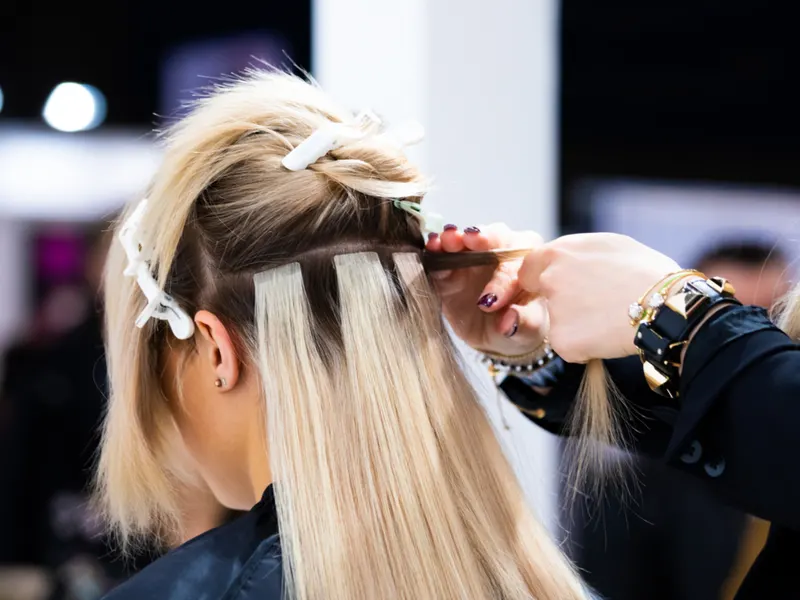
Leszek Glasner/Shutterstock
Pros
- Best for thin hair
- Little to no damage (if installed correctly)
- Can be styled
- Mostly invisible
- Easy to install over other types of extensions
Cons
- May slip if not done properly
- More expensive than clip-ins ($300 – $600)
- High maintenance – requires constant care
- Short life-span
Tape-in hair extensions are medical-grade pre-taped wefts that attach to your hairline and are mostly invisible. Tape-ins are considered semi-permanent hair extensions that last a short while (approx two to three months).
While tape-in hair extensions are reasonably easy to install, it’s best to seek a hairstylist for a smooth and even process.
Sew-in/Weave
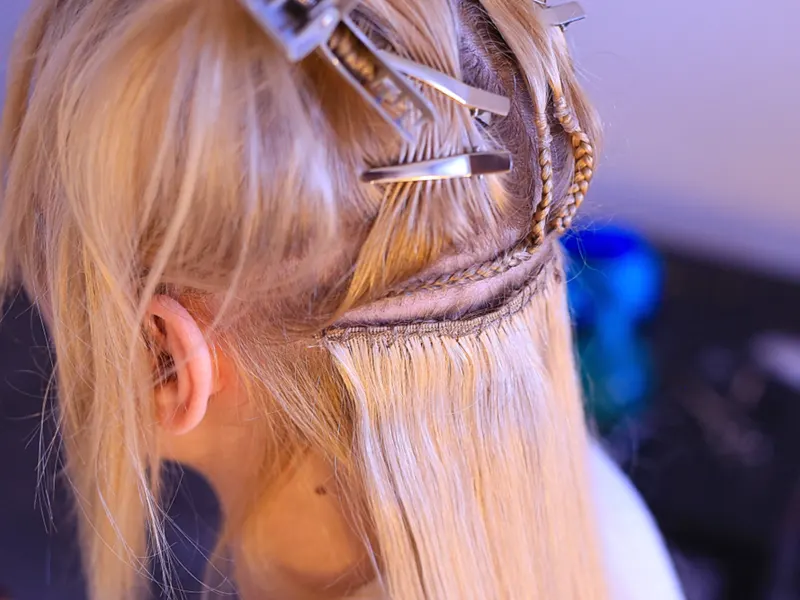
Gorgeoussab/Shutterstock
Pros
- Reasonably priced
- Most comfortable
- Very customizable
- Can do any activity with them such as swimming, sleeping, and other physical activities
- No glue, heat, or damaging process needed to install weaves
- More permanent solution
Cons
- Takes several hours to install
- Tight braids can cause headaches and, in rare cases, alopecia
- Difficult to find a hairdresser who is willing to install the weave
- Not suitable for thin and pin-straight hair types
- Washing and upkeep may become difficult due to the braids underneath.
Hair weaves are invisible to the naked eye and are the most popular; however, they are relatively expensive. Hair extension weaves are sewed into small braided pieces of your hair. Weaves typically last up to two to three months.
Sew-ins need to be installed by a professional and range in price from $300 and up, depending on how much you want and what type of natural hair you have.
Micro Bead
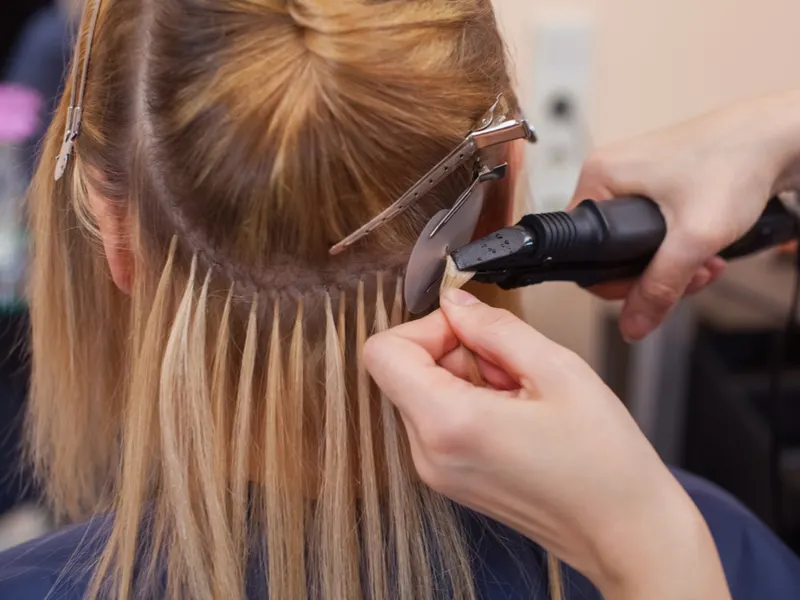
dimid_86/Shutterstock
Pros
- Weightless
- Long-lasting – essentially permanent
- Comfortable
- Customizable experience
- Very durable
Cons
- If not installed correctly, they’ll cause pain
- Long installation process
- You may experience itchy scalp until you get used to them
- Not for fine or thin hair
Microbead hair extensions are the most permanent, lasting for six months, depending on your lifestyle and how well you care for them. Microbeads attach to your natural hair by having a specialist clamp them into your hair.
While microbeads are the most popular option, they are also the most expensive extensions and range from $400 or more. Not to mention it will be hard finding a hairstylist who will install them at a reasonable price.
Read Next: How Much Do Hair Extensions Cost?
What Hair Extensions Are Best for You?
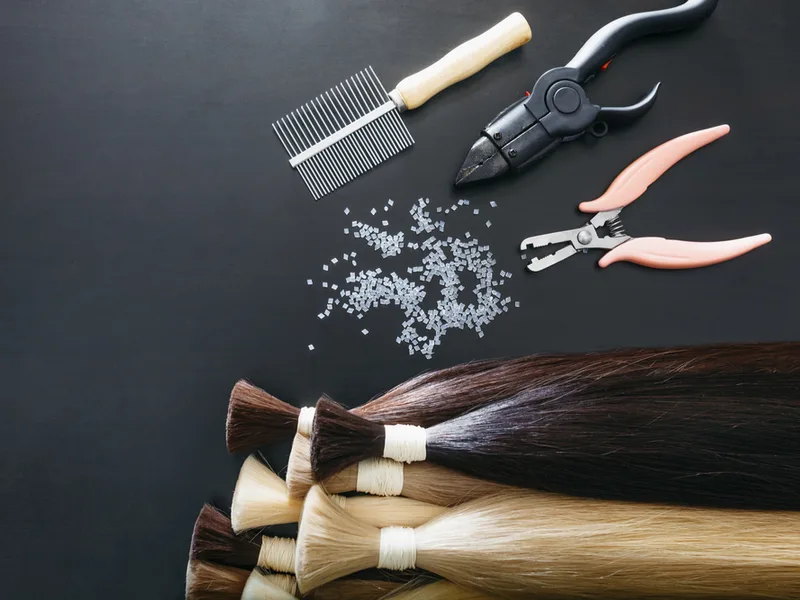
Aliaksandr Barouski/Shutterstock
Many women across the globe use hair extensions for the style, length, volume, and texture of their natural hair. While the methods explained above show the pros and cons of using extensions, some state that they aren’t suited for thin or pin-straight hair.
So the question remains – what hair extensions are best for you? Whether you have thick hair, thin hair, short hair, straight hair, or curly hair, hair extensions were designed to create the look and feel you desire.
For Thick Hair
Women with thick hair assume that wearing hair extensions will add too much volume, which will make it more challenging to style and arrange their hair. First, consider finding hair extensions with the same texture as your natural hair.
Choose an extension that is not thicker or thinner than your natural hair. When you opt for extensions that match your natural hair, you’ll expect to see length over volume.
The best extensions for naturally thick or curly hair are bond-type hair extensions such as micro beading or weaves. On the other hand, if you’re opting for a temporary long-hair fix, you’ll want to wear clip-in extensions.
When searching for the most appropriate hair extension to suit your needs with naturally thick hair, aim for hair extensions that require fewer grams with less traction. Sew-in hair extensions are best suited for thick and curly hair types.
For Thin Hair
Because hair extensions add volume, texture, and length, thin or delicate hair women seek the volumized look over length. However, the problem with finding the perfect hair extension for thin or fine hair is finding an extension that will conceal their hair without added weight.
The best type of hair extension for thin hair is tape-ins, as they use medical-grade tape that conceals to your natural hair without falling or slipping. Another method women with thin and fine hair choose are microbeads, as it clamps to strands and adds the most volume you’re looking for.
Frequently Asked Questions
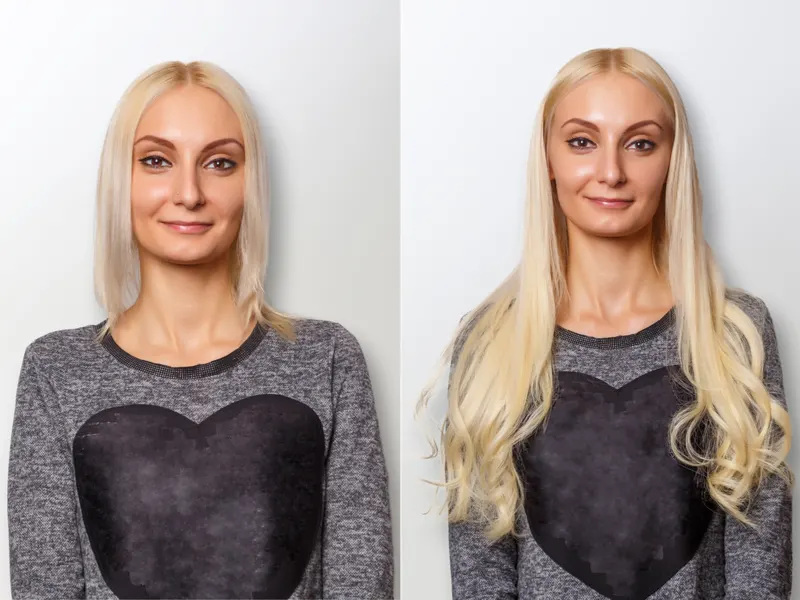
Aliaksandr Barouski/Shutterstock
Should you get hair extensions? While knowing the pros and cons, as well as the best extension for your hair type, you may be wondering other questions to help make your decision.
Here are the most common questions asked by women who wonder about whether they shall get hair extensions or not.
Can You Dye Hair Extensions?
Any human hair extension can be dyed and customized to your liking. Depending on what type of hair extension you have, it may not be a good idea to dye your hair. Synthetic extensions should not be dyed as they will quickly ruin them.
Tape-ins and clip-ins should be dyed before you install them. Any other method can be dyed while it’s in your hair. Be careful of weaves sewn into a braid, as the dying process may make them loose or fall out.
Do Hair Extensions Stop Your Hair from Growing?
No, hair extensions will not stop your natural hair from growing. In fact, they may actually promote hair growth. If you have ever had a bad haircut that’s a little too short for your liking, hair extensions are the quickest fix.
Did you also know that hair extensions help hide your natural hair from heat and moisture? One of the leading causes of damaged hair is due to our environment. Hair extensions provide some protection and relief from this cause, therefore helping your natural hair growth.
Do Hair Extensions Ruin Your Hair?
No, hair extensions will not damage or ruin your natural hair. If you have ever had an experience with damaged hair resulting from extensions, it’s because they were not installed correctly.
Are Hair Extensions Uncomfortable?
Some extension methods may be uncomfortable, such as clip-ins and tape-ins, because your scalp is sensitive. You may feel that your hair is being pulled too much, or your scalp is fairly itchy. Hair extensions are not a “one-size-fits-all” until you become used to your hair extensions.
You will initially feel some discomfort and it takes about a week to get used to your extensions. If you notice severe discomfort with your extensions, you’ll need to get them removed early and find a different solution.
What Can I Do with Hair Extensions?
There is not much you can do with clip-ins as they are not meant for putting in a ponytail or being styled. Other hair extensions, such as tape-ins, sew-ins, and microbeads are more customizable and you can do whatever you please with them.
So, Should I Get Hair Extensions?
Should you get hair extensions? While it really depends, these wonderful products help women build confidence, self-esteem and express themselves. If you’re a newbie in the experience of hair extensions, try clip-ins and see if you like the look and feel of them.
For a longer-lasting look, tape-ins add more personality with the different things you can do. So, should you get hair extensions? Hair extensions are comfortable, help your natural hair grow, are stylish, and for the most part, relatively easy to maintain.
On the other hand, some methods take hours to apply and have the added price of a hairstylist to position them. Each hair extension method will have its own way of caring for them.
